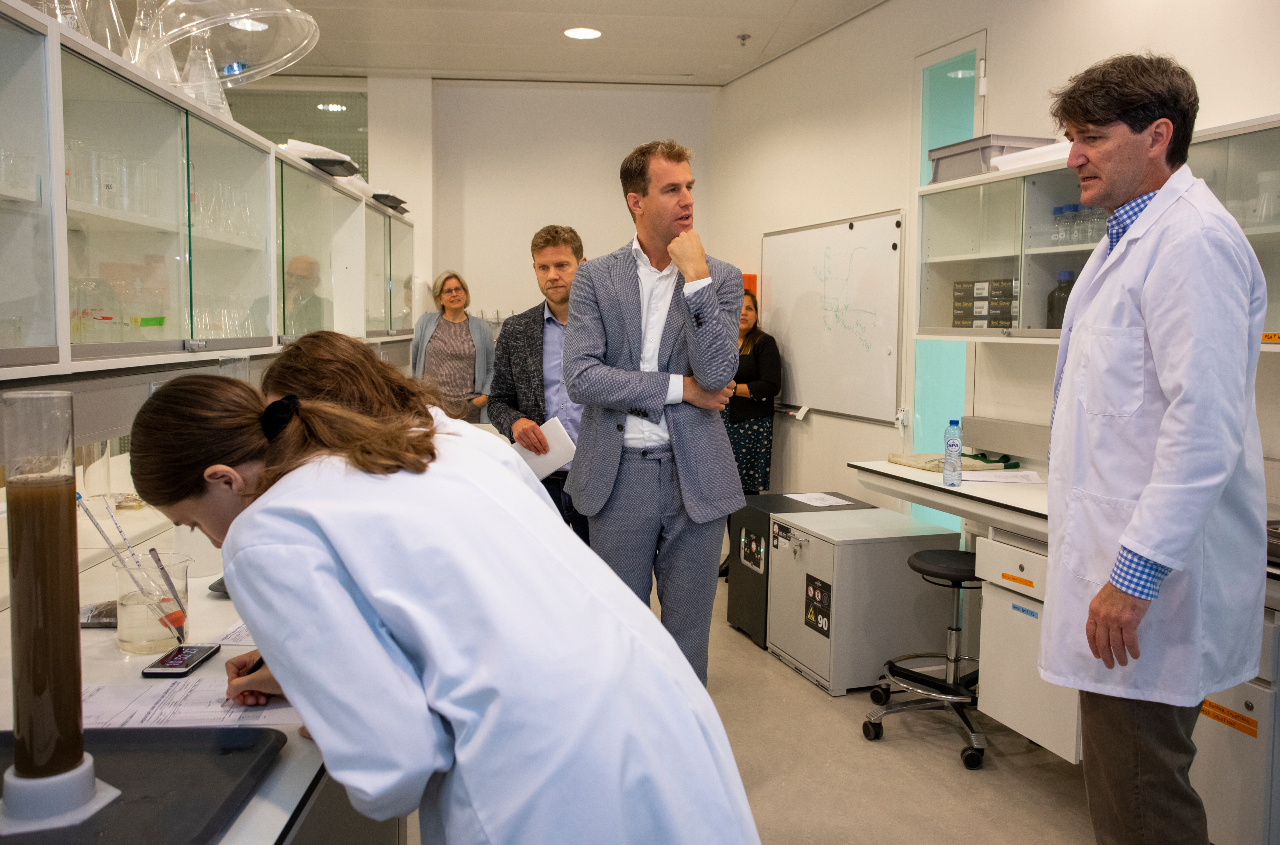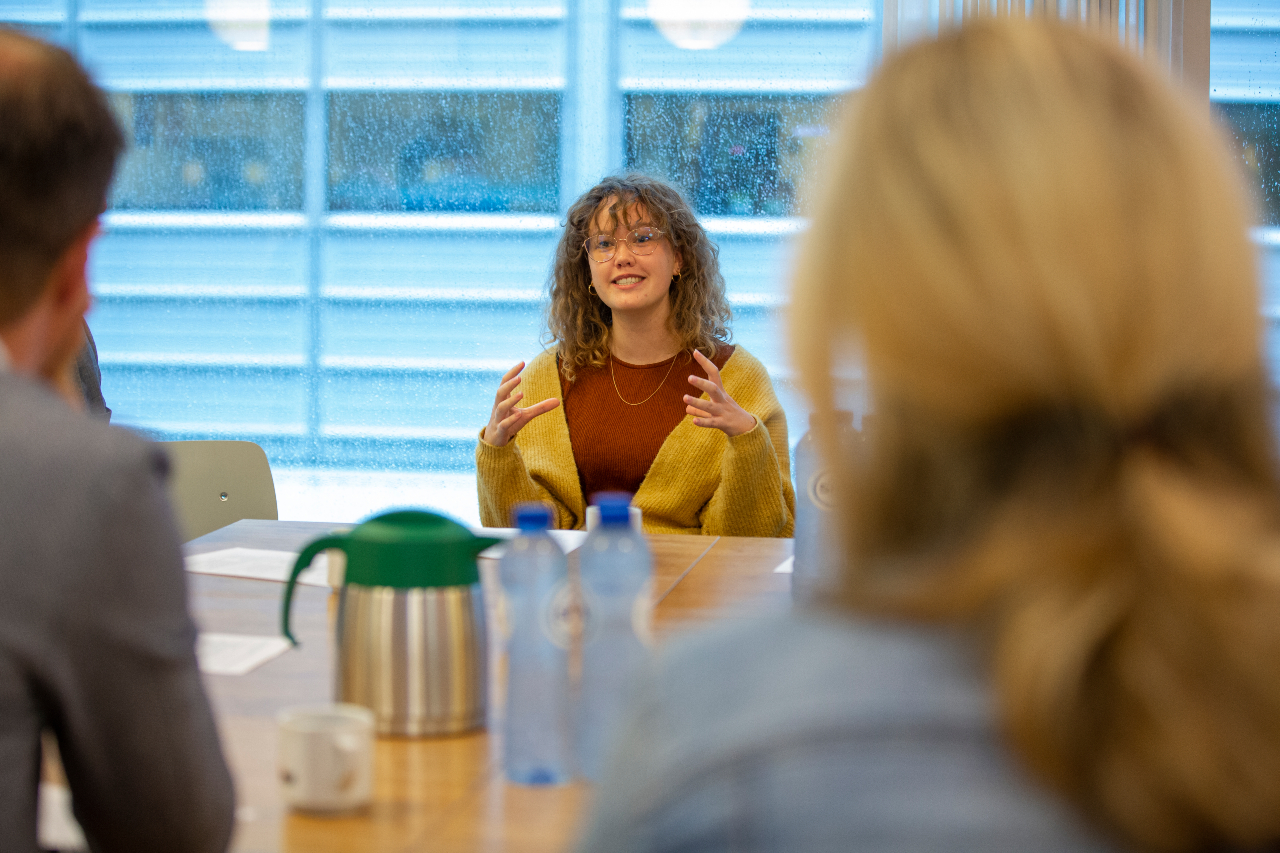
‘Our students are role models for young children in The Hague’
What better way is there for an alderman to find out where best to put his efforts than to pay a working visit to the university? Hilbert Bredemeijer, Alderman in The Hague for Education, Sport and the Outdoor Space, paid a visit to Campus The Hague on Wednesday 6 October 2021.
Whereas most visits end in the bar, this is where the alderman's visit started this time. Erwin Muller, director of Campus The Hague, welcomed Bredemeijer among the sofas, tables, chairs and other household furniture. A large proportion of the 600 students at Leiden University College not only study in the tower block next to The Hague Central Station, but also live there. They don't arrive at lectures in their dressing gowns, says Muller with a smile, but some of them have been known to arrive wearing their slippers.
Bredemeijer paid a visit to Campus The Hague to find out more about student life in The Hague and about the interaction between the city and the university. A group of students were happy to talk to him about their experiences.
Camera traps
Lecturer Thijs Bosker talked about his research on animal life in the city parks. Together with students, he places camera traps in nature areas in The Hague, and together they study the numbers and types of animals that the cameras record. He also conducts research on plastic in the environment. One example of his research is the tests that he carries out at the beach. He picks up a disposable coffee cup. A cup of sand this size contains up to 50 microplastics. He also does plastics challenges with students, where cleaning up the environment goes hand in hand with theory.
Helpless
The discussion also focused on the successful projects and studies that the lecturers and students at Campus The Hague carry out at schools in the city. They give weekly lessons at the Johan de Witt group of schools to a class, helping newcomers learn Dutch. For these new pupils, their speaking of the language is often a bit behind because at school they mostly have to listen, explains Edde, one of the students who help these children.
Manisha takes part in one of the projects at a junior school in The Hague (via the Students for Education programme), helping young children with their Dutch two days a week. Manisha got something of a shock when she first met her class. 'They were talking in Turkish and really wanted me to understand them. I felt so helpless. It really took me by surprise. Fortunately, I heard later from the teacher that their older brothers and sisters were the same, and that they are now doing well. That was quite a relief.' The alderman was enthusiastic about what he heard. 'I'm an enormous fan of these kinds of projects because they benefit so many people at the same time. You learn from them, the children learn from them and you're helping them make up for their language shortcomings. And you take some of the pressure off their teachers.'
Role models
‘Our students are role models for these young children,' adds lecturer Marleen Groeneveld, who works with the Praesidium Verbis project, which is part of the Children of the City programme. The aim of this project is to improve the language abilities of the youngest children in schools. Groeneveld: ‘The key focus is what we can do for the city's children. And by ''we'', I mean our students, as well as our professors. Some of our professorsalso teach at junor schools as part of the ‘Meet the Professor’ scheme. We've also expanded Pre-University college for pupils who want an extra challenge, to include The Hague.'
Extensive notes
Teacher Danielle Chevalier mentions to the alderman that a permanent contact point is needed into the town hall in The Hague so that there is more opportunity to talk about different ways to support the city. And Jim Been, an economics specialist who is involved in the Leiden, Delft, Erasmus thesis workshop, needs data about The Hague for his research and so that he can monitor the effect of the different interventions. Bredemeijer and his staff make extensive notes. They are impressed with the enthusiasm of the teachers and students, and are enormously enthusiastic about what the university can potentially mean for the city.
Accommodation
The students make use of the opportunity to focus attention on a number of thorny student issues. Accommodation, for example. The alderman wants to know exactly what is needed. Jasmijn explains that that means houses that several students can share. In the interests of safety, it is better for students to be able to cycle together. And student houses are also important for the many international students at Campus The Hague, as a way to combat loneliness.
In any event, more consideration needs to be given to international students. More information needs to be provided in English, and there should be ore opportunities to find work and for events and social activities. 'We Dutch students can use our public transport cards to go to parties in Groningen and Maastricht,’ Ishak explains. ‘But the internationals can't do that. They are more dependent on The Hague.' Bredemeijer said that he will be paying close attention to these issues.
Text: Marijn Kramp
Photos: Nicole Romeijn




